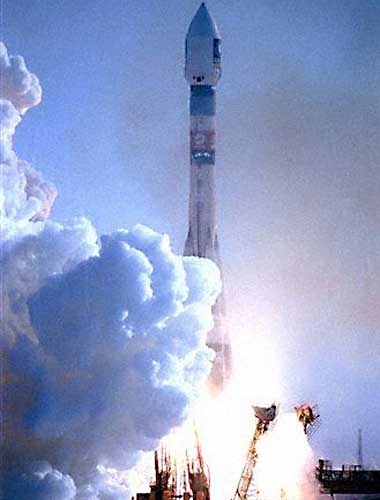Your support helps us to tell the story
From reproductive rights to climate change to Big Tech, The Independent is on the ground when the story is developing. Whether it's investigating the financials of Elon Musk's pro-Trump PAC or producing our latest documentary, 'The A Word', which shines a light on the American women fighting for reproductive rights, we know how important it is to parse out the facts from the messaging.
At such a critical moment in US history, we need reporters on the ground. Your donation allows us to keep sending journalists to speak to both sides of the story.
The Independent is trusted by Americans across the entire political spectrum. And unlike many other quality news outlets, we choose not to lock Americans out of our reporting and analysis with paywalls. We believe quality journalism should be available to everyone, paid for by those who can afford it.
Your support makes all the difference.The first satellite in the European Union's Galileo satellite navigation programmeme was launched from Kazakhstan today, a major step forward for Europe's answer to the United States' Global Positioning System.
The test satellite, named "Giove A," took off from the Baikonur Cosmodrome in Kazakhstan aboard a Soyuz rocket on schedule at 11.19 am local time (0519 GMT). After the launch amid clear skies, the satellite was released into orbit and began transmitting signals, scientists said.
Journalists monitored the liftoff through a linkup at the headquarters of the European Space Agency, or ESA, in Paris.
The €3.4 billion (£2.3 billion) Galileo project will eventually use about 30 satellites and end the Europe's reliance on the GPS system, which is controlled by the US military.
Last year, US President George Bush ordered plans for temporarily disabling GPS satellites during national crises to prevent terrorists from using the navigational technology.
Galileo is under civilian control. The European Space Agency says it will guarantee operation at all times, except in case of "the direst emergency." It also says users would be notified of any potential satellite problems within seconds.
"Galileo is made in Europe by Europeans," ESA spokesman Franco Bonacina said. "If the Americans want to scramble GPS, they can do it whenever they want."
Galileo will also be more exact than GPS, with precision of up to one metre, compared with five metres with GPS technology, Bonacina said.
With Galileo, for example, rescue services will be able to tell ambulances which lane to use on a highway, he said.
The satellite launch was originally scheduled for 26 December but was delayed because of a technical problem in the ground station network.
In orbit, Giove A will test atomic clocks and navigation signals, secure Galileo's frequencies in space and allow scientists to monitor how radiation affects the craft.
A second satellite named "Giove B" - "Galileo In-Orbit Validation Element" - is to be placed in orbit this spring.
Several more satellites will be launched in 2008 to complete the testing phase, which requires at least four satellites in orbit to guarantee an exact position and time anywhere on earth.
Three non-EU nations - China, Israel and Ukraine - have also signed on to the programme set up by the European Commission and European Space Agency. Discussions are also under way with India, Morocco, South Korea, Norway and Argentina, the EU says.
Galileo will more than double GPS coverage, providing satellite navigation for people from motorists to sailors to mapmakers. In particular, Galileo is expected to improve coverage in high-latitude areas such as northern Europe.
Consumers are expected to be able to buy Galileo-ready receivers from 2008, and they will be able to switch back and forth between GPS and Galileo, similar to how people can change between cell phone networks now, Bonacina said. The Galileo system should be fully functional by 2010.

Join our commenting forum
Join thought-provoking conversations, follow other Independent readers and see their replies
Comments